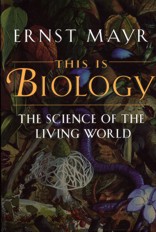Undergraduate
level courses
Bio 198A:
Honors Proseminar and Research
If you are interested
in the Honors program for the 2008/2009 academic year, contact
me immediately.
Course website
Contemporary topics
in biology selected by students in the course will form the basis for
an introduction to scientific journals, the scientific method, and research
as a professional pursuit. Each student develops a refined research proposal
and prepares a seminar summarizing the proposal and the current state
of knowledge in the topic area. Students will develop and refine their
methodology under the direction of a faculty sponsor.
Syllabus
Field trips. None
Prerequisite: Open only to honors students in Biological Sciences who
have an overall GPA of 3.25 and a minimum of 3.0 GPA in biology courses
(at least six units of upper division biology excluding BIO 106, 108,
194, 195, 197 and 199).
Graded: Credit/No Credit
Scheduling: Every fall; next offered Fall 2008
Units: 2
 Text:
Sindermann, Carl J. (2001) Winning the Games Scientists Play.
Perseus Publishing, Cambridge, Massachusetts. 290pp.
Text:
Sindermann, Carl J. (2001) Winning the Games Scientists Play.
Perseus Publishing, Cambridge, Massachusetts. 290pp.
ISBN: 0-7382-0425-0 Required.
Bio 198B:
Honors Research and Seminar
If you are interested
in the Honors program for the 2008/2009 academic year, contact
me immediately.
Course website
Directed research
involving completion of an independently conducted research project for
which a proposal and methodology was developed in BIO 198A. Data collection,
summary and analysis, and formulation of conclusions based on the data
will be discussed periodically with a faculty sponsor. Culmination will
consist of preparation of an undergraduate thesis and presentation of
a seminar summarizing results and conclusions. Note: Open only to honors
students in Biological Sciences.
Course fee: $15.
Prerequisite: BIO
198A. Open only to honors students in Biological Sciences who have
an overall GPA of 3.25 and a minimum of 3.0 GPA in biology courses
(at least six units of upper division biology excluding BIO 106, 108,
194, 195, 197 and 199).
Graded: Credit/No Credit
Scheduling: Every spring, next offered Spring 2007
Units: 2
Text:
No text.
Graduate-level
courses
Bio 292:
Biological Concepts
Course
Website
Seminar: Tuesday,
Thursday from 7pm to 8:15 pm (3 hours total).
Historical approach
to the development of major concepts of the biological sciences. Examples
of concepts may include molecular evolution, cell concept, gene concept,
species concept, and ecosystem concept. Literature, seminars, and term
paper will be used to develop concepts from ancient times to the present.
Scheduling: Every fall, next offered Fall 2008
Units: 3
 Text:
Mayr, E. (1997) This is Biology: The Science of the Living World.
Harvard. Cambridge, Massachusetts. 323 pp. ISBN 0-674-88469-8 (pbk) Not Required.
Text:
Mayr, E. (1997) This is Biology: The Science of the Living World.
Harvard. Cambridge, Massachusetts. 323 pp. ISBN 0-674-88469-8 (pbk) Not Required.
Bio 293:
Research Conference
Scheduling: TBA (2
hours)
Presentation and
discussion of graduate student and faculty research and current literature
with emphasis on critical evaluation of research design, data analysis
and presentation techniques. Note: Discussion two hours. May be taken
twice for credit. Only two units may be applied to the University's requirement
for 200-level courses.
Prerequisite: Graduate
status and instructor permission.
Scheduling: Typically every semester
Units: 2
Text: none
Bio 294F:
Graduate Seminar. Topic: Parental Care
Discussion: Wednesday
5:30 to 6:20 pm (1 hour)
We will be working
our way through the book "The Evolution of Parental Care"
by T.H. Clutton-Brock. The main focus of the course will be evolution,
ecology and life-history but there will also be ample room for discussion
of physiology as it pertains to parental care. The book is not limited
to any one taxa and in fact attempts to cover all taxa, so people with
diverse interests should find the topics relevant to their own area of
interest. The book is divided into fourteen chapters, making it ideal
for a seminar-type class.
Text: Clutton-Brock,
T.H. (1991) The Evolution of Parental Care. Princeton University
Press, New Jersey. 352 pp. Required
![[Go to CSUS Home Page]](gifs/csus_logo.jpg)
![[Go to CSUS Home Page]](gifs/csus_logo.jpg)
Text: Sindermann, Carl J. (2001) Winning the Games Scientists Play. Perseus Publishing, Cambridge, Massachusetts. 290pp.
Text: Mayr, E. (1997) This is Biology: The Science of the Living World. Harvard. Cambridge, Massachusetts. 323 pp. ISBN 0-674-88469-8 (pbk) Not Required.
![[Go to CSUS Home Page]](gifs/csus_logo.jpg)